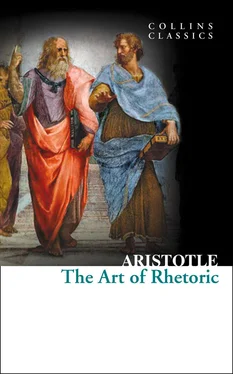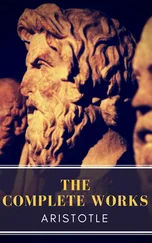Further, what is rare is a greater good than what is plentiful. Thus, gold is a better thing than iron, though less useful: it is harder to get, and therefore better worth getting. Reversely, it may be argued that the plentiful is a better thing than the rare, because we can make more use of it. For what is often useful surpasses what is seldom useful, whence the saying:
The best of things is water.
More generally: the hard thing is better than the easy, because it is rarer: and reversely, the easy thing is better than the hard, for it is as we wish it to be. That is the greater good whose contrary is the greater evil, and whose loss affects us more. Positive goodness and badness are more important than the mere absence of goodness and badness: for positive goodness and badness are ends, which the mere absence of them cannot be. Further, in proportion as the functions of things are noble or base, the things themselves are good or bad: conversely, in proportion as the things themselves are good or bad, their functions also are good or bad; for the nature of results corresponds with that of their causes and beginnings, and conversely the nature of causes and beginnings corresponds with that of their results. Moreover, those things are greater goods, superiority in which is more desirable or more honourable. Thus, keenness of sight is more desirable than keenness of smell, sight generally being more desirable than smell generally; and similarly, unusually great love of friends being more honourable than unusually great love of money, ordinary love of friends is more honourable than ordinary love of money. Conversely, if one of two normal things is better or nobler than the other, an unusual degree of that thing is better or nobler than an unusual degree of the other. Again, one thing is more honourable or better than another if it is more honourable or better to desire it; the importance of the object of a given instinct corresponds to the importance of the instinct itself; and for the same reason, if one thing is more honourable or better than another, it is more honourable and better to desire it. Again, if one science is more honourable and valuable than another, the activity with which it deals is also more honourable and valuable; as is the science, so is the reality that is its object, each science being authoritative in its own sphere. So, also, the more valuable and honourable the object of a science, the more valuable and honourable the science itself is in consequence. Again, that which would be judged, or which has been judged, a good thing, or a better thing than something else, by all or most people of understanding, or by the majority of men, or by the ablest, must be so; either without qualification, or in so far as they use their understanding to form their judgement. This is indeed a general principle, applicable to all other judgements also; not only the goodness of things, but their essence, magnitude, and general nature are in fact just what knowledge and understanding will declare them to be. Here the principle is applied to judgements of goodness, since one definition of ‘good’ was ‘what beings that acquire understanding will choose in any given case’: from which it clearly follows that that thing is hetter which understanding declares to be so. That, again, is a better thing which attaches to better men, either absolutely, or in virtue of their being better; as courage is better than strength. And that is a greater good which would be chosen by a better man, either absolutely, or in virtue of his being better: for instance, to suffer wrong rather than to do wrong, for that would be the choice of the juster man. Again, the pleasanter of two things is the better, since all things pursue pleasure, and things instinctively desire pleasurable sensation for its own sake; and these are two of the characteristics by which the ‘good’ and the ‘end’ have been defined. One pleasure is greater than another if it is more unmixed with pain, or more lasting. Again, the nobler thing is better than the less noble, since the noble is either what is pleasant or what is desirable in itself. And those things also are greater goods which men desire more earnestly to bring about for themselves or for their friends, whereas those things which they least desire to bring about are greater evils. And those things which are more lasting are better than those which are more fleeting, and the more secure than the less; the enjoyment of the lasting has the advantage of being longer, and that of the secure has the advantage of suiting our wishes, being there for us whenever we like. Further, in accordance with the rule of co-ordinate terms and inflexions of the same stem, what is true of one such related word is true of all. Thus if the action qualified by the term ‘brave’ is more noble and desirable than the action qualified by the term ‘temperate’, then ‘bravery’ is more desirable than ‘temperance’ and ‘being brave’ than ‘being temperate’. That, again, which is chosen by all is a greater good than that which is not, and that chosen by the majority than that chosen by the minority. For that which all desire is good, as we have said;’ and so, the more a thing is desired, the better it is. Further, that is the better thing which is considered so by competitors or enemies, or, again, by authorized judges or those whom they select to represent them. In the first two cases the decision is virtually that of every one, in the last two that of authorities and experts. And sometimes it may be argued that what all share is the better thing, since it is a dishonour not to share in it; at other times, that what none or few share is better, since it is rarer. The more praiseworthy things are, the nobler and therefore the better they are. So with the things that earn greater honours than others – honour is, as it were, a measure of value; and the things whose absence involves comparatively heavy penalties; and the things that are better than others admitted or believed to be good. Moreover, things look better merely by being divided into their parts, since they then seem to surpass a greater number of things than before. Hence Homer says that Meleager was roused to battle by the thought of
All horrors that light on a folk whose city
is ta’en of their foes,
When they slaughter the men, when the burg is
wasted with ravening flame,
When strangers are haling young children to thraldom,
(fair women to shame.)
The same effect is produced by piling up facts in a climax after the manner of Epicharmus. The reason is partly the same as in the case of division (for combination too makes the impression of great superiority), and partly that the original thing appears to be the cause and origin of important results. And since a thing is better when it is harder or rarer than other things, its superiority may be due to seasons, ages, places, times, or one’s natural powers. When a man accomplishes something beyond his natural power, or beyond his years, or beyond the measure of people like him, or in a special way, or at a special place or time, his deed will have a high degree of nobleness, goodness, and justice, or of their opposites. Hence the epigram on the victor at the Olympic games:
In time past, heaving a Yoke on my shoulders,
of wood unshaven,
I carried my loads of fish from, Argos to Tegea town.
So Iphicrates used to extol himself by describing the low estate from which he had risen. Again, what is natural is better than what is acquired, since it is harder to come by. Hence the words of Homer:
I have learnt from none but mysell.
And the best part of a good thing is particularly good; as when Pericles in his funeral oration said that the country’s loss of its young men in battle was ‘as if the spring were taken out of the year’. So with those things which are of service when the need is pressing; for example, in old age and times of sickness. And of two things that which leads more directly to the end in view is the better. So too is that which is better for people generally as well as for a particular individual. Again, what can be got is better than what cannot, for it is good in a given case and the other thing is not. And what is at the end of life is better than what is not, since those things are ends in a greater degree which are nearer the end. What aims at reality is better than what aims at appearance. We may define what aims at appearance as what a man will not choose if nobody is to know of his having it. This would seem to show that to receive benefits is more desirable than to confer them, since a man will choose the former even if nobody is to know of it, but it is not the general view that he will choose the latter if nobody knows of it. What a man wants to be is better than what a man wants to seem, for in aiming at that he is aiming more at reality. Hence men say that justice is of small value, since it is more desirable to seem just than to be just, whereas with health it is not so. That is better than other things which is more useful than they are for a number of different purposes; for example, that which promotes life, good life, pleasure, and noble conduct. For this reason wealth and health are commonly thought to be of the highest value, as possessing all these advantages. Again, that is better than other things which is accompanied both with less pain and with actual pleasure; for here there is more than one advantage; and so here we have the good of feeling pleasure and also the good of not feeling pain. And of two good things that is the better whose addition to a third thing makes a better whole than the addition of the other to the same thing will make. Again, those things which we are seen to possess are better than those which we are not seen to possess, since the former have the air of reality. Hence wealth may be regarded as a greater good if its existence is known to others. That which is dearly prized is better than what is not – the sort of thing that some people have only one of, though others have more like it. Accordingly, blinding a one-eyed man inflicts worse injury than half-blinding a man with two eyes; for the one-eyed man has been robbed of what he dearly prized.
Читать дальше












